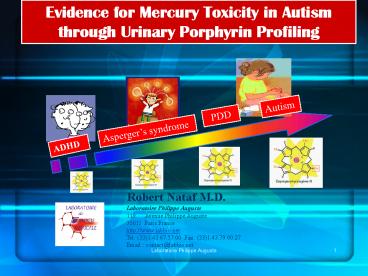Robert Nataf M'D' PowerPoint PPT Presentation
1 / 39
Title: Robert Nataf M'D'
1
Evidence for Mercury Toxicity in Autism through
Urinary Porphyrin Profiling
Autism
PDD
Aspergers syndrome
ADHD
- Robert Nataf M.D.
- Laboratoire Philippe Auguste
- Avenue Philippe Auguste
- 75011 Paris France
- http//www.labbio.net
- Tel (33)1.43.67.57.00 Fax (33)1.43.79.00.27
- Email contact_at_labbio.net
2
(No Transcript)
3
Urinary Porphyrin Levels A Biomarker of
Environmental Toxicity
4
What are the porphyrins?
Porphyrins are cruciform compounds synthesized by
all the cells of the living world which
constitute the active sites of the hemoproteins
which transport oxygen Hb Mb, ensure the energy
production Cytochromes A3, B, C and the
detoxication of xenobiotic, Cytochromes P450.
5
Toxic sensitivity of different porphyrins
Polychorinated Biphenyl (PCB)
UroP Arsenic (As)
7cxP Aluminium (Al)
Mercury (Hg) 5 cxP
PcP CoP
Lead (Pb) CoP
COP-O
COP-OX
URO-D
URO-D
URO-D
Heme
URO-D Uroporphyrin Decarboxylase
COP-O Coproporphyrin oxidase
6
Toxic chemicals in the environment
- Mercury (Hg), Lead (Pb), Arsenic (As),
Polychlorinated Biphenyls and certain pesticides
, are now known to cause many neurodevelopmental
disabilities such as - - Learning or Intellectual Retardation,
- Dyslexia,
- Attention Deficit
- Hyperactivity disorders
- Autism.
7
Hemogloblin Myoglobin
Respiratory Chain Cytochromes CYT A3, CYT B,
CYT C and CYT C1
Cytochrome P450 of Phase I detoxification
8
PORPHYRINS SYNTHESIS
8 enzymes ensured in mitochondrion and the
cytoplasm, the synthesis of porphyrins starts
from the glycine and the succinyl-CoA. They have
a different sensitivity to heavy metals and
derivative organiccompounds which allows to find
the intoxication type.
9
Delta Aminolevulinoic acid (ALA)
Heme
Protoporphyrinogen IX
Porphobilinogen
Protoporphyrinogen IX
7-carboxyporphyrinogen III
Coproporphyrinogen III
6-carboxyporphyrinogen III
5-carboxyprophyrinogen III
10
Xenobiotic compounds
11
Uro ? 7-carboxy ?
Xenobiotic Impacts
Uro
7-carboxy
12
Uro ? 7-carboxy ?
Xenobiotic Impacts
Uro
7-carboxy
13
Aluminium (Al)
14
Arsenic (As)
15
Lead (Pb)
16
Mercury (Hg)
17
Role of Mercury , CPOX and UROD in Heme
biosynthetic pathway
Hg
CPOX
UROD
8-CP
6-CP
7-CP
5-CP
4-CP
2-CP
Heme
CPOX4
KICP
James S. Woods et al.. Texicology Letter 2005.
18
Polymorphism Influence of Cop-Ox on Mercury
toxicity reflected by Porphyrin Profile
CPOX
Wild Cop-Ox 85
Cop-Ox mutation N272H exon 4 15
19
5-carboxy ? Precopro ? Copro ?
Mercury Impacts
Copro
Precopro
5-carboxy
20
5-carboxy ? Precopro ? Copro ?
Mercury Impact
Copro
Precopro
5-carboxy
21
(No Transcript)
22
Effects of consecutive DMPS injections on
urinary porphyrin concentration in MMH-exposed
rats
23
Linear Relationship of Prechelation Urinary
Porphyrin Concentrations with Urinary Mercury
Concentrations
Correlation coefficient (r)
Following a single DMPS Injection
Correlation coefficient (r)
Following MMH Exposure for 6 Weeks
24
Porphyrins Measures the Kidney Mercury content
and Mercury Body Burden during Prolonged
Methylmercury Exposure in Rat
S.D. Pingree, P.L.Simmonds, K.T. Rummel, J.S.
Woods,Toxicological Sciences 61, 234-240 (2001)
- Mercury exposure elicits characteristics changes
in the urinary porphyrin excretion Pattern. - Urinary porphyrin levels in MMH-exposed rats
were highly correlated with kidney mercury levels
and declined with consecutive DMPS treatments. - Prechelation urinary porphyrin levels are highly
correlated with Postchelation urinary. - Prechelation urinary porphyrin levels are highly
correlated with Renal mercury Contents.
25
Mercury Autism
Heavy metal toxicity, particularly mercury, has
been implicated in the etiology of autism and
related spectrum disorders. Despite several
studies addressing heavy metal exposure through
elemental analysis and epidemiology, direct
evidence for mercury toxicity in autism is
lacking. We report a study of urinary
porphyrins, markers of heavy metal exposure, in
269 children with neurodevelopmental disorders.
The specific porphyrin profile in a subset of
children with autistic syndrome points to mercury
toxicity in this disorder.
26
COPRO (autist)
COPRO (control)
? 5cxP ? PrP ? Copro
5-carboxy (autist)
PRECOPRO (autist)
5-carboxy(control)
PRECOPRO (control)
Autist
Control
27
Copro
Precopro
5-carboxy
28
Copro
Precopro
5-carboxy
29
A study on urinary porphyrin levels in 256
children with neurodevelopmental and related
disorders including 106 with autistic disorder.
Nataf R, Skorupka C, Amet L, Lam A, Springbett
A, Lathe R, Porphyrinuria in childhood autistic
disorder
30
269 Study Subjects (2002-2004)
31
Coproporphyrin levels in urines of children with
neurodevelopmental and related disorders
n2
n2
n2
n4
CTRL 2 x SD
CTRL MEAN
32
Elevated urinary Coproporphyrin (COPRO) levels in
ASD expressed as absolute values normalised to
creatinine (left) or as an internal ratio with
uroporphyrin (URO) (right)
33
Precoproporphyrin and pentacarboxy porphyrin
Markers of heavy metal toxicity
Control
ASP
AUT EPI
AUT
(1.28)
(1.09)
(0.62)
(0.56)
Precoproporphyrin plotted against baseline
uroporphyrin the ratio is independent of
age-related creatinine variation
34
Spectrum of mean porphyrin excess, expressed as a
ratio of control group (CTL) value for the
different porphyrin subtypes
35
Outcome of chelation
DMSA (Dimercaptosuccinic Acid )
Chelation (DMSA)
No Chelation
Non-ASD Control Group
1st
2nd
1st
2nd
Reduction in urinary coproporphyrin on chelation
with DMSA
36
Conclusion
- Porphyrinuria is a reliable marker of
environmental toxicity - The increasing population exposure to heavy
metals including mercury evidence of increasing
prevalence of autistic disorder.
37
Urinary Porphyrins
- To affirm the intoxication ex. toxic impact on
the physiology of the organism. When a numerical
biological value is not enough - To Orient the diagnosis etiologic by certain
profiles to porphyrins (mercury). - To measure the overload through the intensity of
the toxic impact exerted by the biologically
active compartment thus pathogenic. - To Monitor the detoxication (chelation.) through
the reduction of the toxic effect.
38
Urinary Porphyrin Levels A Biomarker of
Environmental Toxicity
Nataf R, Skorupka C, Amet L, Lam A, Springbett,
Lathe R, Porphyrinuria in childhood autistic
disorder, The Lancet Neurology (in press)
39
Thank you

